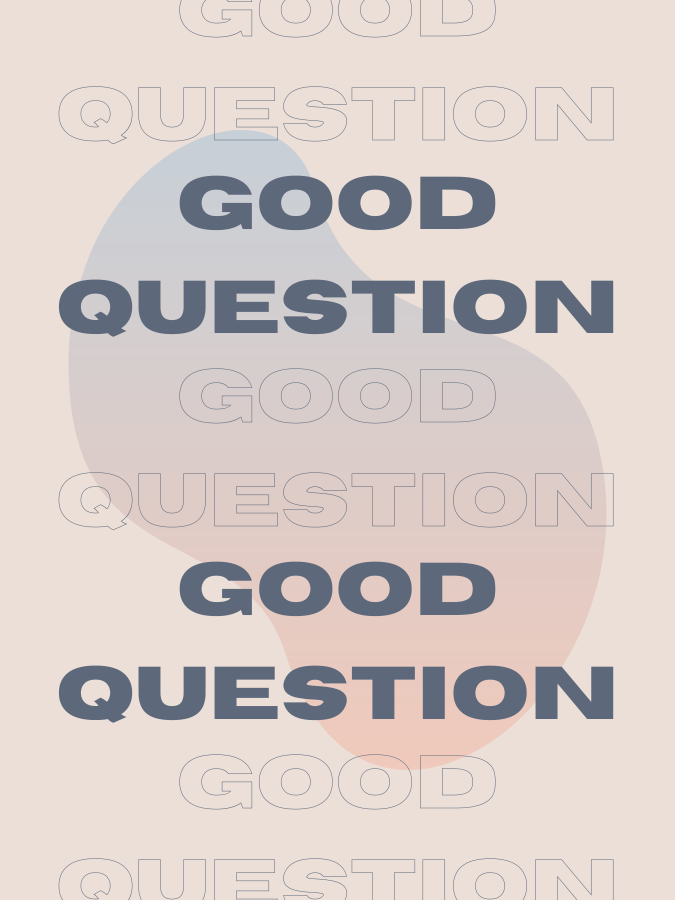
Are there any ways to deal with unresolved grief?
Welcome to our advice column where our editors offer thoughtful answers to your pressing inquiries. Head here to submit an anonymous question, and follow here for new Good Questions.✨
What tools can be useful when dealing with unresolved grief?
If you’ll first allow me, I’d like to give you the warmest virtual hug. I understand this pain intimately, and I am wishing you all the comfort and love possible, especially since it seems you have the self-awareness to recognize unresolved grief.
“Grief can be like the ocean, at times swallowing you whole.”
Grief can be like the ocean, at times swallowing you whole. My grandparents lived with my immediate family when I was growing up; I was incredibly close with them, my grandma in particular. When I was almost 14, my grandmother passed away after a long illness. I found peace that she was no longer in pain, but the grief of her loss has abounded in ways I didn’t even know were possible. Even though I’ve officially lived my life longer without her than with her, I still find myself tearing up at old family photos or crying (read: ugly sobbing) at old home videos.
Your grief may stem from the loss of a loved one, the end of a friendship or relationship, or grief for life pre-pandemic; all of it is valid. And however it translates for you is valid too, whether that’s sadness, anger, or helplessness. The upside (if there ever was one) is that almost everyone experiences it in their lifetime. And because it’s universal, there are a variety of tools that work well in addressing it.
To start, I’ve found it helpful to understand what my “grief triggers” are, whether it’s a time of year (like the holidays) or a specific day. My grandma’s passing anniversary and birthday are both hard, even 15+ years later. If you can anticipate tough moments, you can also proactively aim to soothe yourself as they happen. Plan a gentle activity, like a warm bath or a walk in the park, so that even if you are struggling, you are practicing self-compassion.
“Plan a gentle activity, like a warm bath or a walk in the park, so that even if you are struggling, you are practicing self-compassion.”
I’ve also found support by asking for it directly. Consider telling a few close friends what you’re going through and maybe even encourage them to support you. It may seem odd to offer direct guidance, but once they know how they can best comfort you, you’ll have a network ready to embrace you.
As far as practical tools go, I turned to the experts. My close friend is a grief counselor for adolescents who’ve lost loved ones, and she recommends finding a way to talk through what you’re feeling. This could be via peer groups, one-on-one therapy, or artistic expression. Because there is no “right” way to cope, this may take some time for you to find what works best, but I recommend starting with a resource like What’s Your Grief. The platform offers e-courses and interactive guides to navigate the grieving process vetted by mental health professionals.
If you’re interested in support groups, check out The Dougy Center for Grieving Children and Families. In addition to resources for kids through adults, The Dougy Center offers a global directory of peer groups, where you may be able to meet virtually or safely in person. If a one-to-one interaction serves you better, look to grief counselors in your area via Psychology Today or your insurance, or consider virtual therapy.
“When we’re holding back or unable to address our feelings head-on, these activities can help to unlock those emotions in a way we can safely and externally express.”
In a more unstructured setting, artistic expression and creativity can also help. When we’re holding back or unable to address our feelings head-on, activities like creative writing, collaging, painting, or making natural remedies can help to unlock those emotions in a way we can safely and externally express. Or, if your unresolved grief centers around connection to a loved one, this can be a comforting way to find closure and calmness as well as creating a future tool you can look to in tough moments, like a scrapbook or a photo album on your phone.
For ongoing resources you can ease into your life, there are podcasts and Instagram accounts centered around grief and loss, like the Grief Out Loud podcast, Too Damn Young by Vivian Nunez, and even Facebook mourning groups for online communities. While these may be helpful, I encourage you to take note of your mental space before diving in or clicking “follow”, because this continuous engagement could feel overwhelming or too invasive at times. Addressing unresolved grief can be a tricky balance, and it’s important to find tools that are ultimately healing rather than triggering.
Remember: Grief can be a lifelong experience, so it may never truly feel “resolved.” But with each passing day and as we address it, it will get easier. In the meantime, in those moments where you feel enveloped by pain and sadness, may you extend yourself grace and comfort. Hopefully with some time and the tools above, the tsunami of grief will feel more like a gentle wave, lapping at your ankles as you walk forward through it.
“Hopefully, the tsunami of grief will feel more like a gentle wave, lapping at your ankles as you walk forward through it.”
Read more Good Questions here.
Have something on your mind? Click the button below 👇 ✨
RELATED READING
Henah Velez (she/her) is an Editor at The Good Trade. Prior to her work here, Henah worked in the nonprofit sector for more than seven years including at She’s the First, a nonprofit fighting for a world where every girl chooses her own future. Based out of Santa Barbara, you can usually find Henah roaming around local downtowns and small businesses, hanging with her pets, or traveling as much as possible.

